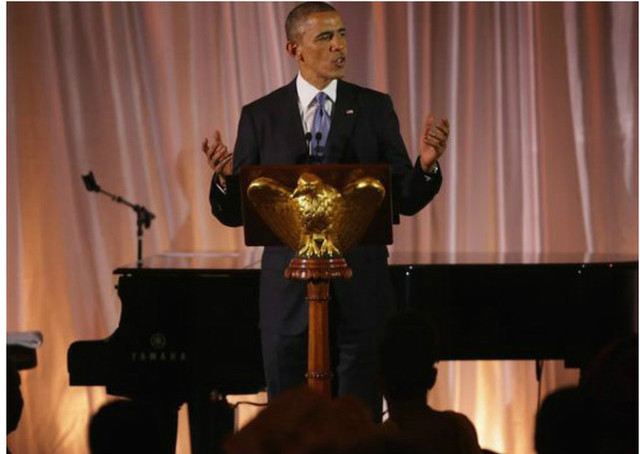 DeWayne Wickham, dean of Morgan State University’s School of Global Journalism and Communication, writes for USA TODAY. (President Obama at US-Africa White House dinner on August 6th/Getty Images)
DeWayne Wickham, dean of Morgan State University’s School of Global Journalism and Communication, writes for USA TODAY. (President Obama at US-Africa White House dinner on August 6th/Getty Images)
By DeWayne Wickham
The dinner President Obama hosted last week for leaders of more than 50 African nations should be seen by journalists, and the historians who follow in their wake, as a significant moment.
Not because of its mammoth size: A quarter of the member states of the United Nations were represented. Nor for its grand setting: This wasn’t the first time a large presidential dinner was moved to a sprawling tent on the South Lawn of the White House.
This gathering was both a symbolic and substantive final curtain to the 1884 Berlin Conference that sanctioned the partitioning of Africa by European powers. As author Adam Hochschild points out in his book King Leopold’s Ghost, which chronicles the brutal intrigue that led up to that conference: “Not a single African was at the table in Berlin.”
Africa was then seen as a plentiful source of natural resources and a marketplace for European goods. “The Berlin Conference was the ultimate expression of an age whose newfound enthusiasm for democracy has clear limits,” Hochschild writes.
While Europe’s colonial occupation of Africa has long been broken, the continent became a geopolitical football during the Cold War, a status that continues today as an East-West struggle for economic hegemony over Africa rages. China has pumped billions of dollars into the continent. But according to a recent report in The New York Times, the former governor of Nigeria’s central bank, Lamido Sanusi, said, “China takes our primary goods and sells us manufactured ones. This was also the essence of colonialism.”
As American and European companies struggle to keep pace with China’s economic advances in Africa, activists in the United States and Africa complain that some U.S. businesses are blocking the publication of federal regulations that will make the money they pay to do business in Africa more transparent. Bribes and under-the-table payments made by Western nations are believed to divert hundreds of millions of dollars out of the treasuries of African governments.
“Widespread corruption is an affront to the dignity” of African nations and “siphons off resources that should be used to lift people out of poverty,” Vice President Biden said last week in an address to the African leaders.
Speaking at the business forum portion of the summit, Obama, too, signaled the need for a new economic relationship with Africa.
“We don’t look to Africa simply for its natural resources; we recognize Africa for its greatest resource, which is its people and its talents and their potential,” the president said. “We don’t simply want to extract minerals from the ground for our growth; we want to build genuine partnerships that create jobs and opportunity for all our peoples and that unleash the next era of African growth. That’s the kind of partnership America offers.”
That’s the truly history-making part of this summit, which — unlike the Berlin Conference — made African leaders major participants in a discussion of their continent’s future. And it happened on the watch of America’s first black president.
“I stand before you as the president of the United States and a proud American. I also stand before you as the son of a man from Africa,” Obama said to African leaders at the White House dinner last Tuesday. “The tides of history … bring us together this week.”
And in giving Africans leaders a collective seat at the table with the world’s greatest superpower to discuss the continent’s fate, Obama’s move demands that those who chronicle the history of these times give special notice to his treatment of the African people and their leaders.
Video: President Obama Post U.S.-Africa Summit Press Conference
—
Related:
Media Panel Shares Recommendations at Capitol Hill During US-Africa Leaders Summit
Photos & Video: President Barack Obama’s Historic U.S.- Africa Summit
Obama Announces $33B Commitment at Africa Forum
African & U.S. Scientists Hold Technology & Innovation Symposium at US-Africa Summit
Civil Society Forum Kicks Off at Historic US-Africa Summit in DC
US-Africa Summit Events Under Way in Washington
First Lady Michelle Obama Speaks on Girls’ Education at YALI Presidential Summit
Bill Clinton, Michael Bloomberg at Africa Summit
Meet the Mandela Washington Fellows From Ethiopia
Obama Renames Africa Young Leaders Program For Nelson Mandela
U.S.-AFRICA SUMMIT 2014: Preview
Transport Chiefs From Five Countries to Visit Chicago Ahead of U.S.-Africa Summit
Ambassador David Shinn on the 2014 U.S.-Africa Leaders Summit
Join the conversation on Twitter and Facebook.


























